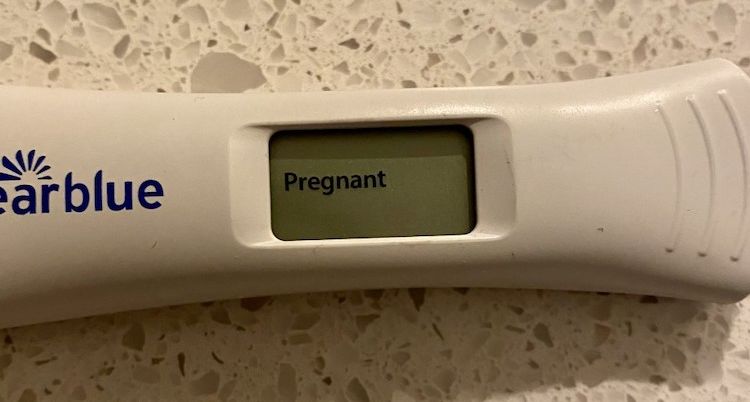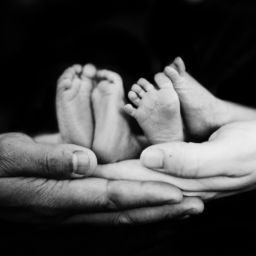
I’m pregnant.
Those are two words I grew to believe I’d never type or say after three years of negative tests.
Those words are, I realize, a super drastic contradiction to this headline. Because this headline is both inaccurate and forever accurate, I suppose. About a year into trying to get pregnant, I was diagnosed with “unexplained infertility” to go along with some apparently top-secret endometriosis I didn’t know about.
That diagnosis is just about the most infuriating one for a control freak to have. I wanted a problem to fix, to then move on to the next step in our calculated plan.
When my husband and I first decided we’d start trying, I remember excitedly telling a friend our plans over dinner one night.
“You’ll be pregnant within four months,” she predicted. Instead of accepting her positivity, I said, “I don’t know. I just have a feeling I won’t be able to.” But I didn’t have a feeling, not really. I just had my typical unnecessary and irrational pessimism. I was approaching getting pregnant with the same mantra I learned after buying my first house: Prepare for the worst, hope for the best.
Turns out, my expectation was unfortunately right. But what was truly unexpected was what I experienced over the next 36 cycles (but who’s counting?) trying to conceive.
Like many of us, I have people close to me who’ve faced some form of infertility, which is a pretty small label covering a wide swath of very, very different situations, if you ask me. So if I had known getting pregnant would become as seemingly impossible as it did, I could’ve told you what I thought would happen based on others’ stories: Scheduled sex becomes work. Being infertile is lonely and isolating. It becomes your identity. Talking about it is embarrassing. You feel like you’re to blame, no matter how much you know otherwise.
Versions of those things happened, sure, but my infertility didn’t feel like the infertility I thought I knew. In fact, I had absolutely no idea what was coming.
So here are nine things I didn’t expect to learn while being infertile.
(Please note that this is just my experience—everyone’s is different, and I wouldn’t, and couldn’t, speak for anyone but myself.)
1. I lived cycle to cycle, in two-week stints. I can’t tell you the number of times I thought about how I was living the definition of insanity—trying the same thing over and over again, expecting different results. But because no one had told me I couldn’t, I continued to believe we could. So we kept trying the same thing, again and again. And I kept living the infamous “two-week wait,” between ovulation and your period, or TWW as it’s known on the infertility message boards (we’ll get to that in a second), over and over again, expecting and hoping for different results. Then another two weeks after that before ovulation. It’s excruciating to measure the passage of time by how many days until your next negative pregnancy test, days before or past ovulation, or days before or past your period. And then turn around and begin the waiting all over again. It’s something I wouldn’t wish on my worst enemy.
2. I learned a bunch of goofy acronyms. Listen, I’ve been on the internet for most of my life. I’m aware that every community has its own language and accompanying set of acronyms, so the fact that I had to learn dozens of new ones to understand the infertility community wasn’t surprising. But I just … don’t understand why many of them exist. A few of my favorites:
- BD: “Baby dance.” As in, you know, sex. I can’t comprehend what’s preventing anyone from typing just one more letter, but then again, I tend to feel that way about most acronyms. I’m also certain I’ve never said “baby dance” in my life outside of typing it about 13 seconds ago.
- AF: No, it’s not what you’re thinking. This version is for “Aunt Flo.” Similar to “baby dance,” (which I’ve now said three times), I’m unclear why grownups can’t say “period” or “menstruation” when they’re already dealing with some very heavy, mature stuff. Or maybe I just answered my own question.
- DH: “Dear husband.” I’ve seen this one mostly used sarcastically, which, when you’re scrolling through message boards from 2009 to answer your infertility question at 3 a.m., adds juuuuust the right amount of much-needed voyeur entertainment. It’s like the infertility version of trashy reality TV.
3. The fertility washing. I’m not sure what else to call it, and as someone who works in marketing, I can certainly appreciate the creativity that goes into marketing fertility products to infertile women—almost. First, there are the cutesy product names. Premom. Pregmate. Proception. Then there are the targeted ads, selling me products for everything you could imagine. And yes, obviously I got suckered into purchasing a few. Some, though, seem to border on exploitation of the vulnerable. Pinterest ads for books promising if you “do just this one thing!” you’ll be pregnant next cycle. The barrage of (in)fertility products I didn’t know I needed was seemingly endless.
4. No one knows what to say, and that’s okay. I’ve seen Instagram meme after Instagram meme of the stupid things people say to women having difficulty conceiving. I knew I’d at some point get one or two of them and I braced myself for what I’d say when I eventually heard an “It’s all part of God’s plan,” or a “What’s meant to be will be.” But the truth is, I didn’t get those, not exactly. I did, however, get a few uncomfortable stinging comments from friends who meant well, but genuinely didn’t know what to say. The sting never lasted long, because the intention behind their comments was always clear: They wanted to express nothing more than support or sympathy. As someone who never has the right words to say at the right moment, I will always accept the kind intentions of a good friend over what that intention ultimately became verbally.
RELATED: REAL TALK ABOUT BEING PREGNANT DURING A GLOBAL PANDEMIC
5. The data part was actually kind of fun. Calling back to my obsessive control-freak, type-A ways, I tracked everything related to my cycle. Daily. Hourly. On multiple apps. I watched every line chart for trends, every test for patterns, cross-referencing over last month’s stats and comparing the average from every cycle I had tracked. Truly, it was the only thing I was able to control, and it would’ve been a whole lot of nerdy data fun … if, you know, this hadn’t sucked so much as a whole.
6. I found out I really liked affirmative thinking. I’m a pretty big realist. I’m not religious or the praying type, and I wish I had more romantic beliefs about spiritualism and the world, but I don’t. I say all that to show how … weird it is that I learned to love affirmative thinking, especially after disclosing my penchant for pessimism earlier. I began telling myself that “it worked,” and that my “body is ready for this.” I have no idea whether it actually has an impact, and I truly don’t care. At worst, it’s strange that I talk to myself. At best? I was finally kind to myself after months of the opposite. Moreover, it’s a good habit I’ve continued and foresee carrying indefinitely.
7. I wasn’t immovably devastated. I’m going to immediately couch this and say: Yes, there were tears. Absolutely there were. But I kept waiting for my infertility to consume my life, and it just didn’t. Maybe it was because I kept up my blissfully ignorant hope each month. Or maybe it was because my husband and I had a set plan: Try on our own for a set period of time before medical intervention, trying less-invasive options before moving to IVF, and if that failed, then adoption. We would become parents, regardless of the method.
8. I lied to myself about that last one. Sometimes it’s hard to see when you’re in it, and this was absolutely one of those situations. I might not have been in constant despair, but the level of unacknowledged anxiety I had during that time period only made itself aware when I was a few months pregnant and I had unknowingly let my subscription to Calm—something I previously relied on heavily—lapse.
9. I was the constant bearer of bad news. Because I owned all that data in my phone, and also the uterus in my body, I had the unlucky draw of being the bearer of bad news to my husband every month. That burden was one I didn’t expect, and certainly would never want again. But I’d do it all over again just to be able to have the opportunity to give him the one piece of good news we finally got after 36 months of bad.
I know not to compare my experience to others, but I certainly can’t overlook the fact three years of negative tests pales in comparison to the loss some people have experienced. And I’m aware that, as I sit here nearly eight months pregnant, I’m able to look at the above with hindsight, and immense relief that Infertile Amy couldn’t begin to imagine would come.
And, most of all, it came with gratitude. Gratitude for the doctors who helped us, for the friends and family who listened as I obsessed over test strips, for my husband’s partnership, and for the family we’ll soon have. It makes the above nine revelations worth every second, and those moments make me appreciate life more than I ever thought was possible.
All of our content—including this article—is completely free. However, we’d love if you would please consider supporting our journalism with an Indy Maven membership.
















